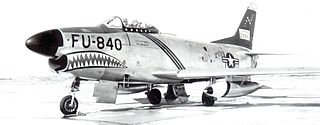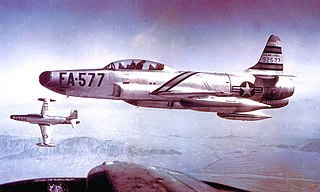503d Air Defense Group  | |
|---|---|
| Active | 1945-1947, 1953–1955 |
| Country | |
| Branch | |
| Type | Fighter Interceptor |
| Role | Air Defense |
| Part of | Air Defense Command |
The 503d Air Defense Group is an inactive United States Air Force organization. Its last assignment was with the 25th Air Division of Air Defense Command at Portland International Airport, Oregon. It was inactivated on 18 August 1955.

The United States Air Force (USAF) is the aerial and space warfare service branch of the United States Armed Forces. It is one of the five branches of the United States Armed Forces, and one of the seven American uniformed services. Initially formed as a part of the United States Army on 1 August 1907, the USAF was established as a separate branch of the U.S. Armed Forces on 18 September 1947 with the passing of the National Security Act of 1947. It is the youngest branch of the U.S. Armed Forces, and the fourth in order of precedence. The USAF is the largest and most technologically advanced air force in the world. The Air Force articulates its core missions as air and space superiority, global integrated intelligence, surveillance, and reconnaissance, rapid global mobility, global strike, and command and control.

The 25th Air Division is an inactive United States Air Force intermediate echelon command and control organization. It was last assigned to First Air Force, Tactical Air Command (ADTAC). It was inactivated on 30 September 1990 at McChord Air Force Base, Washington.

Portland International Airport is a joint civil-military airport and the largest airport in the U.S. state of Oregon that accounts for 90% of passenger travel and more than 95% of air cargo of the state. It is within Portland's city limits just south of the Columbia River in Multnomah County, 6 miles by air and 12 mi (19 km) by highway northeast of downtown Portland. Portland International Airport is often referred to by its IATA airport code, PDX. The airport covers 3,000 acres of land.
Contents
- History
- World War II
- Cold War
- Lineage
- Assignments
- Components
- Stations
- Aircraft
- Commanders
- Service streamer
- See also
- References
- Notes
- Bibliography
The group was originally activated as a support group at the end of World War II and provided logistics and administrative support for the 86th Fighter Group in Germany until 1946, when the group returned to the United States, where it supported the 56th Fighter Group. It was discontinued when the USAF reorganized its combat and support units on its bases into a single wing.
A group is a military aviation unit, a component of military organization and a military formation. The terms group and wing differ significantly from one country to another, as well as between different branches of a national defence force.

World War II, also known as the Second World War, was a global war that lasted from 1939 to 1945. The vast majority of the world's countries—including all the great powers—eventually formed two opposing military alliances: the Allies and the Axis. A state of total war emerged, directly involving more than 100 million people from over 30 countries. The major participants threw their entire economic, industrial, and scientific capabilities behind the war effort, blurring the distinction between civilian and military resources. World War II was the deadliest conflict in human history, marked by 50 to 85 million fatalities, most of whom were civilians in the Soviet Union and China. It included massacres, the genocide of the Holocaust, strategic bombing, premeditated death from starvation and disease, and the only use of nuclear weapons in war.
In military aviation, a wing is a unit of command. In most military aviation services, a wing is a relatively large formation of planes. In Commonwealth countries a wing usually comprises three squadrons, with several wings forming a group. Each squadron will contain around 20 planes.
The group was activated once again in 1953, when ADC established it as the headquarters for two dispersed fighter-interceptor squadrons and the medical, maintenance, and administrative squadrons supporting them. It was replaced in 1955 when ADC transferred its mission, equipment, and personnel to the 337th Fighter Group in a project that replaced air defense groups commanding fighter squadrons with fighter groups with distinguished records during World War II.

An interceptor aircraft, or simply interceptor, is a type of fighter aircraft designed specifically to attack enemy aircraft, particularly bombers and reconnaissance aircraft, as they approach. There are two general classes of interceptor: relatively lightweight aircraft built for high performance, and heavier aircraft designed to fly at night or in adverse weather and operate over longer ranges.

A squadron in air force, army aviation, or naval aviation is a unit comprising a number of military aircraft and their aircrews, usually of the same type, typically with 12 to 24 aircraft, sometimes divided into three or four flights, depending on aircraft type and air force. Land based squadrons equipped with heavier type aircraft such as long-range bombers, or cargo aircraft, or air refueling tankers have around 12 aircraft as a typical authorization, while most land-based fighter equipped units have an authorized number of 18 to 24 aircraft.




























